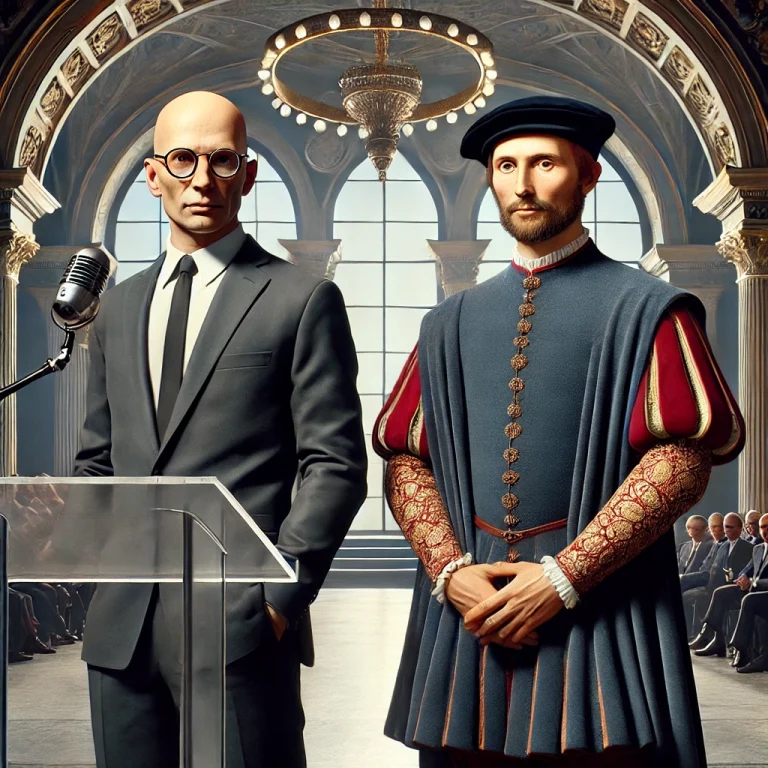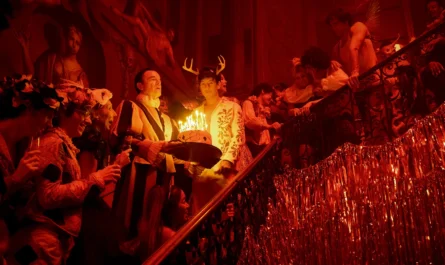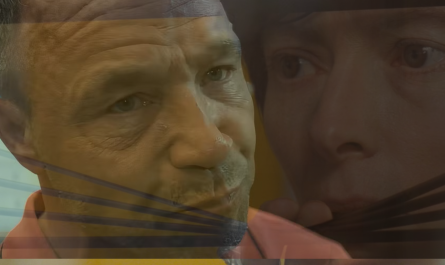Spoiler Alert! This article contains spoilers of Good Boy!
Good Boy (2022) is a Norwegian psychological thriller that explores trust, deception, and the dark side of human relationships. Directed by Viljar Bøe, the film follows Christian (Gard Løkke), a seemingly charismaticman who lives in an isolated house with his pet dog. However, this “dog” is not ordinary, it’s a man dressed as one named Frank (Nicolai Narvesen), who willingly assumes the role of Christian’s loyal pet.
The story begins when Sigrid (Katrine Øpstad), a young woman, meets Christian through a dating app. Initiallycharmed by his kindness, she becomes increasingly alarmed when she gets greeted by Frank and his canine behavior. Christian explains that Frank’s lifestyle is his choice, but Sigrid grows uneasy, thinking there is more to the situation.
As Sigrid starts to investigate, she discovers Christian’s sinister secrets when, in a walk, Frank reveals his lifestyle isn’t consensual. The tension grows as Sigrid becomes afraid of Christian’s intentions and her own safety. She then tries to hide a knife under her pillow in case she needs it, but Christian quickly finds it and reveals he heard her conversation with Frank through the hidden microphones and cameras. Chrisitan goes crazy and starts threatening both of them, he then locks up Frank in his cage and starts hitting it with a bat while playing loud music on his headphones while Sigrid tries to escape.
The final act is unsettling, showing Christian’s need for dominance and his disregard for others, treating people as subhuman entities. The violence and control dynamics escalate until he kidnaps Sigrid as well and locks her up in the backyard hut. In the end, Sigrid and Frank fail in their attempt to rebel and -in fear of the consequences- they both succumb to the canine lifestyle imposed by Christian.
Power, Control, and Privilege: Machiavelli and Foucault’s Theories Reflected in Good Boy
Good Boy psychological thriller analysis proves the film’s nature as disturbing and odd, one might even wonder –what is this film trying to convey?- The movie portrays a popular topic in the 2020s: the financial gap across the world, and how power makes people prone to abusing it and getting away with it. I have talked about art and film being contemplative about the social and historical context surrounding a piece, and this movie is no exception. Christian is the perfect example of having enough resources to follow impulses and depravations and get away with them. Not only does Christian get away with enslaving Frank forcing him to behave like a dog, but his girlfriend, Sigrid, tries to rescue Frank and stop that madness, only to end up enslaved herself.
The most gripping side to it is Christian having the money and the houses to hide both Frank and Sigrid away from society and the police. Even if they seek help, no one will find or even hear them. Chrisitan could also get away with manipulating others into either staying quiet or believing it’s acceptable and consensual. People usually admire those with money and power, purely because they possess it. Distorting the perception they have of them, for example, some people who are friends with someone insanely wealthy and want to be like him/her, sometimes normalize the weird things they do, only to keep the glorified image they’ve built of them, and such image provides a sense of proximity to that wealth. Many people -unconsciously- normalize the weird things some of those in the elite do because if they show a hint of disagreement or discomfort, the opportunity to grow along them disappears. Yet, we could argue that power is perverse because it can only be preserved by perversion.

Analysis of Machiavelli’s Theories in Cinema
In the book The Prince by Niccolò Machiavelli, one of the key themes surrounds love and fear saying a governor should be feared before loved, as long as he’s not hated, since fear ensures obedience.
In the movie, Sigrid fears Christian and that is why she ends up oppressed alongside Frank because she didn’t have enough hate or resentment to dare kill Christian when she initially hid the knife under the bed. She is motivated by fear trying to run away, but fear doesn’t get you as far as hate does. Just like love, hate is blind. Hate is impulsive, revengeful, and filled with blind spots. In a way, fear can provide the courage needed to escape either a repulsive or oppressive environment. Machiavelli mainly wrote about power in politics and businesses, but his explanations for power dynamics can also be seen in other types of abuse, for instance, Christian abusing his friends.
“A workforce that is driven by fear will be less likely to take risks as they worry about the consequences of their mistakes.”
Analysis of Foucault’s Theories in Cinema
On the other hand, we can look at Discipline and Punishment by Michel Foucault and compare it with the tactics applied by Christian to oppress Sigrid and Frank. Foucault references Jeremy Bentham and his Metaphor of the Panopticon Prison, which describes a prison with a central tower in which a guard can look at all the prisoners, but they don’t know when they’re being observed. This makes them behave as if they are constantly observed, even if no one is looking. Foucault then uses that idea as a metaphor for modern power, claiming people start watching themselves and behaving “accordingly” because they feel they could be observed.
This type of control is more subtle but effective because you don’t need to punish all the time: it is enough if people feel watched. A perfect example is security cameras in public spaces. Even though there is no one looking at the cameras, the possibility of being observed makes people follow the rules. In other words, surveillance is a very powerful tool.
If we look at Chrisitan’s tactics, he has cameras and microphones surrounding his house. This is how he found out Frank asked Sigrid for help. This new feeling of being watched and having to be careful with the surveillance around the house pushes Sigrid into submission to Christian’s twisted desires.
In conclusion, the combination of fear of the consequences and the feeling of always being patrolled keeps Frank and Sigrid kidnapped and abused by a wicked, yet clever, wealthy man. Good Boy is a chilling examination of human psychology, blurring the lines between the bizarre and the terrifying, and leaving audiences questioning the nature of voluntary behavior and moral boundaries, especially dark human relationships.






kuvipvin has a pretty slick interface. Loads fast, and everything’s easy to find. Good range of betting options as well. Nice solid overall experience so far. Check it out: kuvipvin
Can you be more specific about the content of your article? After reading it, I still have some doubts. Hope you can help me.
I don’t think the title of your article matches the content lol. Just kidding, mainly because I had some doubts after reading the article.
Thanks for sharing. I read many of your blog posts, cool, your blog is very good.
Can you be more specific about the content of your article? After reading it, I still have some doubts. Hope you can help me.
I don’t think the title of your article matches the content lol. Just kidding, mainly because I had some doubts after reading the article.
Thanks for sharing. I read many of your blog posts, cool, your blog is very good.
Can you be more specific about the content of your article? After reading it, I still have some doubts. Hope you can help me. https://www.binance.com/en-IN/register?ref=A80YTPZ1
Thank you for your sharing. I am worried that I lack creative ideas. It is your article that makes me full of hope. Thank you. But, I have a question, can you help me? https://www.binance.com/si-LK/register?ref=LBF8F65G